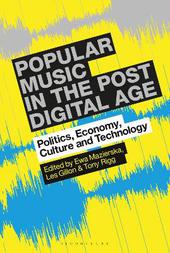
|
Popular Music in the Post-Digital Age: Politics, Economy, Culture and Technology
Paperback / softback
Main Details
| Title |
Popular Music in the Post-Digital Age: Politics, Economy, Culture and Technology
|
| Authors and Contributors |
Edited by Professor Ewa Mazierska
|
|
Edited by Les Gillon
|
|
Edited by Tony Rigg
|
| Physical Properties |
| Format:Paperback / softback | | Pages:304 | | Dimensions(mm): Height 229,Width 152 |
|
| Category/Genre | Theory of music and musicology
Music recording and reproduction |
|---|
| ISBN/Barcode |
9781501365362
|
| Classifications | Dewey:781.6309051 |
|---|
| Audience | | Tertiary Education (US: College) | |
|---|
|
Publishing Details |
| Publisher |
Bloomsbury Publishing Plc
|
| Imprint |
Bloomsbury Academic USA
|
| Publication Date |
25 June 2020 |
| Publication Country |
United States
|
Description
Popular Music in the Post-Digital Age explores the relationship between macro environmental factors, such as politics, economics, culture and technology, captured by terms such as 'post-digital' and 'post-internet'. It also discusses the creation, monetisation and consumption of music and what changes in the music industry can tell us about wider shifts in economy and culture. This collection of 13 case studies covers issues such as curation algorithms, blockchain, careers of mainstream and independent musicians, festivals and clubs-to inform greater understanding and better navigation of the popular music landscape within a global context.
Author Biography
Ewa Mazierska is Professor of Film Studies at the University of Central Lancashire, UK. Les Gillon is a researcher, musician and teacher at the University of Central Lancashire, UK. Tony Rigg is a music business practitioner with a background in senior management positions for market leading companies, a music producer with a chart pedigree and an educator.
Reviews[This book] does work of interest to historians of technology, 'thinking across' categories of technology, society, and culture, and dwelling on the historical specificity of each. * Technology and Culture * A timely addition to music and cultural scholarship because it raises a multitude of important questions concerning ways in which a highly marketized and commodified popular music industry might just be able to find its way through the neoliberal fog. * Leonardo Reviews * Barna and Magaudda provide two good examples of how, by following the actors themselves as they envision a future for music, grope and sketch the contours of the worlds to come, it is possible to think about them in an original way. * Volume! The French Journal of Popular Music Studies * Music industry is in a condition of permanent flux driven by music's seamless adaptation to digital innovation. The key tension in music industry as a practice is that digital application does not always chime with regulated ownership of intellectual property rights in music. This is an impressive collection in which all participants have worked in a focused way to specify how music industry is transformed by digitization. In a turbulent environment, this collection exhibits staying power and will be a useful point of reference for academics and students over a prolonged period. * Michael Jones, Senior Lecturer in Music, University of Liverpool, UK, and author of The Music Industries: From Conception to Consumption (2012) * In an era of ever-expanding technological possibility and pace, time is an invaluable and irreplaceable resource. As such, how we listen and to what we listen becomes a nuanced and important question about how we understand each other and our relationship to the places we live. Popular Music in the Post-Digital Age provocatively explores this from multiple perspectives and ideas, asking critical questions about the continued evolution and role of one of humankind's most expressive and important languages - the language of music. * Burke Jam, Sound Artist, Composer, and Director of Digital Facilities at Portland State University, USA * This is an important contribution to the growing literature on the present era of music, its practitioners and consumers, not least because of the international breadth of its coverage. * Dave Laing, Research Fellow, Institute of Popular Music, University of Liverpool, UK *
|